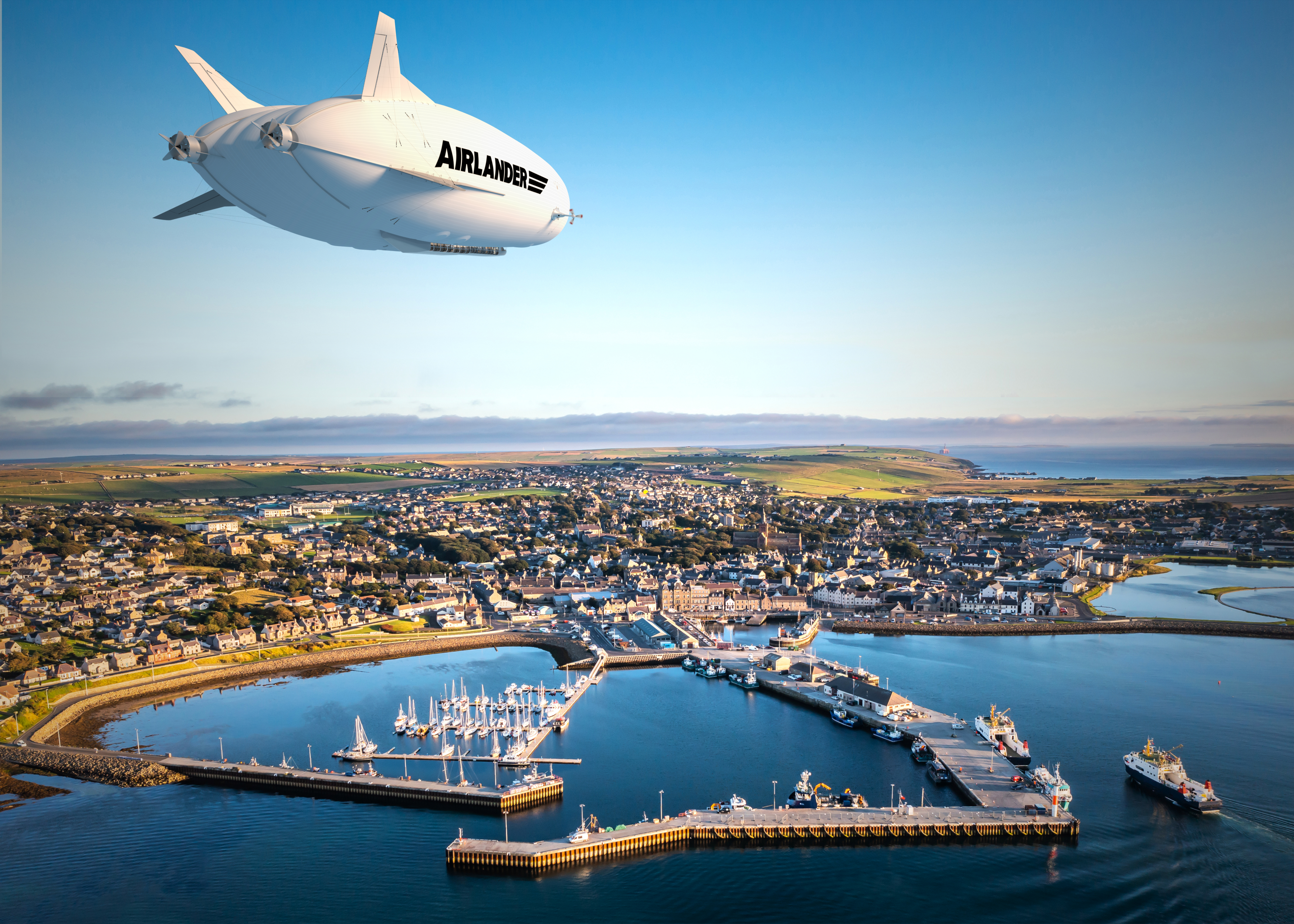
New concept study finds Airlander 10’s addition to the transport ecosystem in the Highlands and Islands of Scotland could deliver new opportunities for green passenger and freight transportation.
Hybrid Air Vehicles has today announced the results of a first of its kind concept study into the role of Airlander, the world’s most efficient large aircraft, finding that it can deliver cost-effective, low-emission passenger transport and freight to the Highland and Island communities in the North of Scotland. The study was part funded by the UK Government through UKRI funding to the SATE (Sustainable Aviation Test Environment) project of which HAV is a partner.
The report was supported by AECOM, Highlands and Islands Airports Limited (HIAL), Highlands and Islands Transport Partnership (HITRANS), Highlands and Islands Enterprise (HIE), Orkney Islands Council and Loganair, who are all engaged stakeholders in the development and potential of Airlander and how it may operate in the region and offer new solutions to connectivity challenges.
The report highlights that Airlander could help to decarbonise regional travel, add freight capacity into the network and could also provide further economic growth through tourism. It also analyses the forecast dispatch availability given the imperative to maximise operations in the prevailing conditions with minimal delays. The report found that Airlander would provide a high dispatch availability when surveyed against historic weather data and can operate successfully from a range of airports, small island airfields and bodies of sheltered water.
The study concluded that the integration of Airlander into established inter-island transport services could greatly improve regional connectivity, offering a significant expansion of current services, in an area that has been traditionally hard to serve given its outlying islands and highly variable weather conditions. Airlander represents a new category of transport that will enable initially low emissions services with the promise of modification to zero emissions (using electric propulsion and green hydrogen fuel cells). This will assist the region to attain the goal of a net zero Scottish regional air transport by 2040.
Airlander 10 allows a 10 tonne or 100 passenger capacity to be delivered to small airfields currently suited to much smaller aircraft, with low-cost and nominal adaptations to existing infrastructure. The total cost of modifying the six airfields surveyed was less than £2 million.
In the important logistics and freight sector, the report found that the introduction of Airlander in the North of Scotland could provide 79% more air freight capacity compared with 2021, an increase of 43,800 tonnes – the equivalent of 21.9 million extra average sized parcels, thus increasing access to consumer goods and services in a timely manner.
As part of this study, seven on-site surveys were carried out by engineers across HIAL and Orkney Islands Council’s diverse airport portfolios, taking into consideration historic weather conditions at each site, as well as runway, boarding and landing infrastructure to assess the compatibility of these existing locations with the operational needs of Airlander. The locations included Kirkwall, Papa Westray, Stornoway, Barra, Inverness, Sumburgh and Scapa Bay.
The report surmised that Airlander is well-suited to deliver a new network offering to the Highlands and Islands. Airlander would be a greatly beneficial addition to the transport ecosystem, with minimal disruption, that can create new opportunities for economic growth and the development of tourism in the region, with only simple and inexpensive infrastructure upgrades needed.
Tom Grundy, CEO of HAV, said: “Airlander has the potential to revolutionise life in the Highlands and Islands, by offering cost-effective and sustainable mobility that fosters improved passenger, freight and logistics connectivity for previously isolated communities, and boost employment, commerce and tourism. We are thrilled with the results of the study, which confirm the important role Airlander can play, and our partnership with the wider consortium. We look forward to taking further steps toward offering ultra-low emission Airlander services.”
Ranald Robertson, Director, HITRANS-Highland and Islands Transport Partnership said: "I am delighted to see the Airlander concept study published today. We look forward to working further with Hybrid Air Vehicles to identify the specific opportunities, economic impact and timelines this unique aircraft can potentially bring to improving the connectivity of passengers and freight in the Highlands and Islands."
